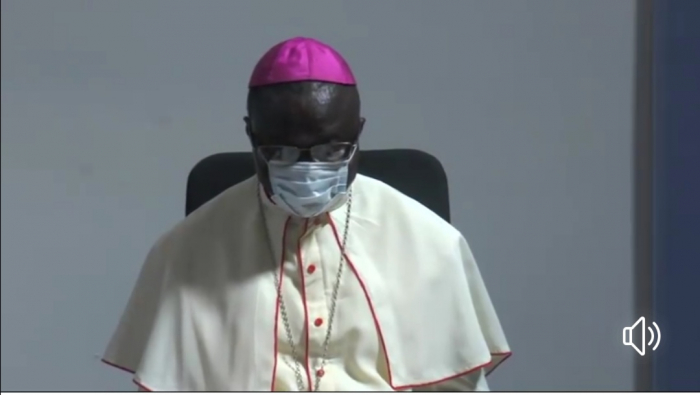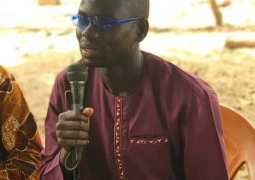
Theme: RELYING ON GOD’S GUIDANCE – IN THE FOOTSTEPS OF ST. JOSEPH
On 8th December, 2020, our Holy Father, Pope Francis promulgated the Apostolic Letter Patris Corde, that is, ‘With A Father’s Heart’ to mark the one hundred and fiftieth anniversary of Pope Pius IX’s proclamation of St. Joseph as the Patron Saint of the Universal Church in 1870. He then declared a Special Year to St. Joseph from 8th December, 2020 to 8th December, 2021 to celebrate this anniversary of St. Joseph’s patronage to the whole Catholic Church. The members of the Church were, consequently, invited by the Pope to devote themselves to St. Joseph as their model and source of inspiration during this year. This Special Year of St. Joseph will, therefore, be observed and celebrated in all the parishes and Deaneries of the Diocese of Banjul throughout the New Year of 2021 we have now started with the Feast of Mary, Mother of God. So my New Year’s message to the priests, religious, seminarians, lay faithful, and all Gambians concerns St. Joseph and his trust and dependence on God in his vocation and journey of faith and our obligation to imitate his noble example. The caption of my New Year’s Message would, therefore, be “Relying on God’s Guidance – In the Footsteps of St. Joseph.” This will enable us to focus on St. Joseph’s lifestyle, confidence, and hope in God throughout this New Year. We will also know and cherish him more as a person of virtue and integrity we can imitate than just a vague and unpopular figure in the story of the birth of our Lord and Saviour Jesus Christ.
As the husband of Mary and the foster Father of the Child Jesus, St. Joseph was confronted with at least five (5) major choice decisions in the Gospels of St. Matthew and St. Luke. He wanted to divorce Mary privately when he discovered in Mt. 1:18-25 that she was with child. But the angel of the Lord appeared to him in a dream and persuaded him to take Mary home as his wife because the child she conceived was through the power of the Holy Spirit. So he decided to do what the angel told him when he woke up and he accepted Mary as his wife. He was deeply concerned about his reputation and integrity in the society when he realized that Mary was pregnant with child before they lived together. But he never did what many would have done in his position. Instead, he decided to take Mary as his wife following the angel’s instruction. He was then confronted with Herod’s evil intention to kill the Child Jesus when he was born in Mt. 2:13-15. Again, he was instructed by the angel of the Lord in a dream to escape into Egypt with Mary and Jesus and remain there until he is informed about their safety. He once again accepted the angel’s warning and readily escaped into Egypt with his family as migrants and refugees in obedience to God and for the sake of his family even though it was a difficult, uncomfortable, and uncertain experience for him.
The next major decisions for St. Joseph were after Herod’s death. The angel of the Lord instructed him in Mt. 2:20 - 22 to rise and return to the land of Israel and he rose and took the child Jesus and his Mother, Mary. But when he learnt that Herod’s son, Archelaus succeeded his father as King of Judea, he was afraid. He was then warned by the angel in a dream and he decided to go to the district of Galilee instead and settled in Nazareth. His plans to return to his ancestral home of Bethlehem in Judea incidentally changed out of fear and he opted to follow the angel’s advice and settled at Nazareth in Galilee. He did not, in that sense, take any risk that exposed his family to danger. Nor did he insist on his own intention to live in his original home district of Judea at the expense of Mary and Jesus. But he was concerned afterwards about the whereabouts of the Child Jesus in Nazareth when they returned from the feast of the Passover in Jerusalem and discovered that he was missing. Both Mary and Joseph decided in Lk. 2:44-49 to look for him among their relatives. But when they did not see him, we are told, they returned to Jerusalem and after three days, they found him in the Temple among the teachers of the Law. He was then told how they were anxiously looking for him everywhere. St. Joseph never rested or lost hope in his search for his foster child, Jesus until he and Mary discovered him in the Temple where he was sitting among the doctors of the Law and asking them sound questions.
In these moments of decision, St. Joseph was ready and willing to listen and follow God’s guidance and message that was revealed to him through the angel. He did not, therefore, rely on his own experience, understanding, and judgment on these occasions. He relied more on God’s guidance and instruction in his decisions and actions and obeyed what God’s angel commanded him to do. His role and conduct in the life of Jesus and Mary was, therefore, in accordance with God’s will because he was open and obedient to God in the crucial moments of his life. He was God’s obedient servant who had no reason whatsoever to doubt or ignore God’s guidance through his angel even in times of uncertainty and danger. His humble and faithful obedience to God was what, Pope Francis said, influenced the Child Jesus. He said in p.5 of his Apostolic Letter Patris Corde that “during the hidden years in Nazareth, Jesus learned at the school of Joseph to do the will of the Father. That will was to be his daily food (Jn. 4:34). Even at the most difficult moment of his life, in Gethsemane, Jesus chose to do the Father’s will rather than his own will.” St. Joseph was, therefore, an admirable and worthy model of obedience and humility to even Jesus, the Son of God and Savior of humanity.
In dedicating this year to St. Joseph and solemnly declaring it a Special Year, Pope Francis is inviting us to equally walk in the footsteps of St. Joseph and imitate his reliance on God’s guidance, humility, and obedience to God’s will. We will also be in similar situations of disappointment, isolation, and uncertainty like St. Joseph, the husband of Mary and foster father of Jesus. We are, consequently, encouraged by the Pope to follow the example of St. Joseph and be willing to listen, rely on God’s guidance, and humbly obey his instruction or command that he reveals to us. Some of us will eventually experience or be involved in problems or matters we cannot understand just like St. Joseph could not understand the cause of Mary’s pregnancy. Others will encounter threats and dangers in their lives from evil forces and powers like Herod who wanted to destroy sacred and innocent life for his own selfish interest and ambition. We may also have to get out of our comfort zone or go out of our way for the good and welfare of others like Joseph and Mary spent more than three days anxiously looking for Jesus. If we find ourselves in such situations, we should, likewise, be open to God’s guidance like St. Joseph and accomplish his demands on us without seeking God’s assurance because St. Joseph never had any sign of assurance from God.
In his vocation and struggles in life, St. Joseph can be perceived as a victim of circumstances, poverty, and oppression. He was always the one who was tasked and sometimes under pressure to sacrifice his position and comfort. The same too can happen to us and we see ourselves as victims of evil forces against us but that was not the case with St. Joseph. In his Apostolic Letter Patris Corde p. 5, Pope Francis observed that we may have “the impression that the world is at the mercy of the strong and mighty, but the ‘good news’ of the Gospel consists in showing that, for all the arrogance and violence of worldly powers, God always finds a way to carry out his saving plan. So our lives may at times seem to be at the mercy of the powerful, but the Gospel shows us what counts. God always finds a way to save us, provided we show the same creative courage as the carpenter of Nazareth, who was able to turn a problem into a possibility by trusting always in divine providence.” This statement is quite relevant and noteworthy. It should inspire and motivate us to overcome our own problems, uncertainties, and challenges in life following in the footsteps of St. Joseph. God was his source of direction, enlightenment, and hope in all his trials and adversities. He was, therefore, successful in making the right decisions to overcome the problems and difficulties he experienced. So the fact that St. Joseph suffered, lived a quiet and private life, and was not extensively mentioned in the Gospels should not make him appear a victim or less important for us. He is still a noble and appealing person of integrity, character, and honor in his own right because he fully succeeded in fulfilling his vocation and role as the foster father of Jesus in accordance with God’s will.
When St. Joseph was in Nazareth, he lived and worked as a carpenter, in order to, earn his living and support his family through the labour of his hands. He fully devoted himself to his occupation as a carpenter regardless of his status as the foster father of Jesus, the Son of God. Precisely, because he cherished his God-given talent as a carpenter and he had a sense of dignity and duty for his work in the family and community in which he lived. He was equally honored by Pope Pius XII in 1955 as the Patron Saint of workers in addition to his initial title as the Patron Saint of the Universal Church. So for us to fully and effectively walk in the footsteps of St. Joseph and imitate his noble example during this New Year that is dedicated to him, we equally need to have a sense of duty and responsibility and be fully committed to our daily tasks and various works in life. The importance of our occupation and our dedication to work in this New Year that is declared a Special Year to St. Joseph is reiterated and reaffirmed by Pope Francis. He said in p. 9 of Patris Corde that “in our own day, when unemployment has once again become a burning social issue … there is a renewed need to appreciate the importance of dignified work of which St. Joseph is an exemplary patron. [For] work is a means of participating in the work of salvation, an opportunity to hasten the coming of the Kingdom, to develop our talents and abilities, and to put them into the service of society and fraternal communion.” If we are seriously committed in this New Year to our occupation and work, we will indeed be walking in the footsteps of St. Joseph. We will also become co-creators with God in transforming and developing ourselves, our families, and human society through the labour of our hands.
As we celebrate the anniversary of the declaration of St. Joseph as the Patron Saint of the Universal Church, let us commend ourselves to him and seek his spiritual assistance by imploring his intercession in these words of prayer: “St. Joseph, wise ruler of God’s earthly household. You are nearest of all people to the heart of Jesus. Be still a father, lovingly providing for us his brethren. Saint strong and manly, chosen by the Father, as the trusted Guardian of the eternal Son, guide us as once you guided Wisdom’s footsteps with sure direction. Husband of Mary, loving and beloved, teach us the joy of love so pure and holy, and warm our hearts with love for God’s own Mother by your example. Saint of the dying blest with Mary’s presence. In death you rested in the arms of Jesus. So at our ending, Jesus, Mary, and Joseph, come to assist us. Amen! On that note, I wish the priests, religious, seminarians, lay faithful, believers in Christ, members of the Muslim community, believers of other faiths, and Gambians at home and abroad, a healthy, peaceful, successful, joyful, blessed, and favourable New Year for us all.
Your Servant in Christ,
+Most Rev. Dr. Gabriel Mendy C.S.Sp.
Catholic Bishop of the Diocese of Banjul, The Gambia.
Read Other Articles In National News





